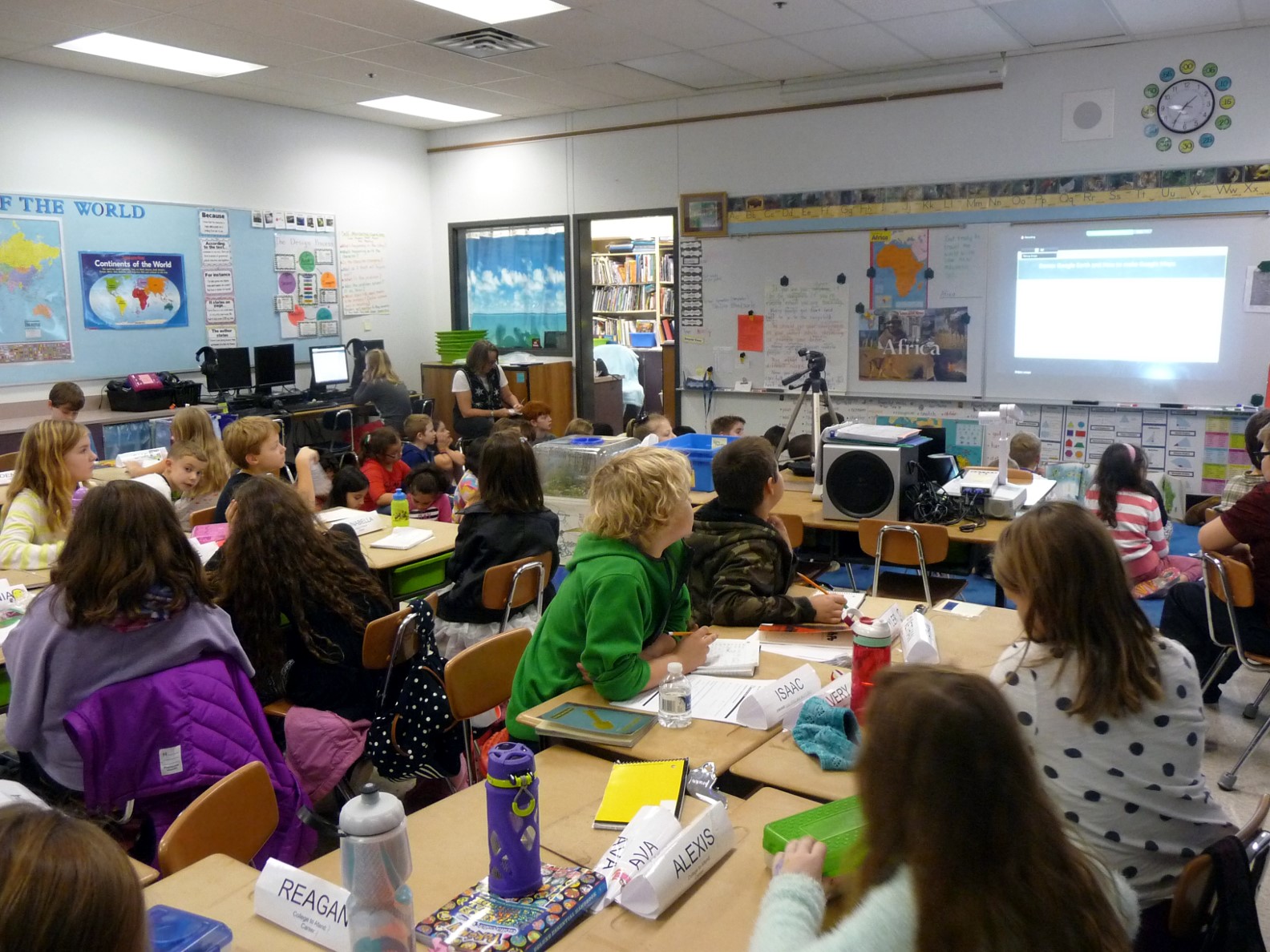What is the Future of Classroom Management?

While conceptualizing this article, I reminisced about my first teaching job. It was as a fifth-grade social studies teacher in my hometown. To be honest, my first year wasn’t necessarily a stellar one. In some ways, I felt overwhelmed, even inadequate in the classroom, especially when it came to classroom management. But with the help of veteran teachers and an understanding principal, I completed that year and became a master teacher by my third year.
My experiences are not at all uncommon. Ask any teacher what their biggest challenge is on a daily basis, and most will say classroom management. Consider, the following classroom scenario. You are a fifth grade English teacher who has just started a lesson on action verbs, but your students have other plans. Matthias interrupts you with a question or an opinion about an unrelated topic, Rebecca is talking to her friend while you are attempting to redirect Matthias, and Susie, who is worried about her mother in the hospital, starts to cry incessantly. On top of that, while you are distracted, Alfred is posting hurtful comments about Rebecca on Facebook. This episode is just the tip of the iceberg, as sometimes these scenes get even more convoluted.
As modern students change their learning styles and expectations for their educations, the way that educators approach classroom management must be modified to meet the needs of today’s K-12 classrooms. So what does the future of classroom management look like? Not an easy question to answer, is it? My thoughts: we must find new and innovative ways to help teachers better manage their classrooms, and we must do it fast.
How is edtech shaping the future of classroom management?
Over the last decade, edtech companies have been experimenting with innovative ways to use technology to help teachers efficiently manage their classrooms. Thankfully, several of these companies are getting it right and are really doing a great job. One company, in particular, NetSupport, has done an excellent job of creating a comprehensive suite of applications designed to help teachers manage their classrooms, and schools maintain the school-wide learning environment.
In this article, I will discuss how two of their solutions, NetSupport School & NetSupport DNA-IT Asset Management & Internet Safety for Schools, can help educators and administrators prevent cyber bullying and academic failure. These tools can be used either as a standalone solution or as one complete suite. NetSupport School is an award-winning classroom management solution, designed in consultation with teachers, to provide dedicated assessment, monitoring, collaboration, and control features to help orchestrate and deliver lesson content – plus maintain students’ focus in technology-led teaching and learning. NetSupport DNA is a complete IT Asset Management & Internet Safety solution that helps technicians to track, monitor, and manage IT assets across the school and district. Although these apps perform different functions, they were created to work in tandem.
Preventing threats of cyber bullying.
Bullying is a common problem in schools. Most children have either been bullied or have known someone who has been bullied. Bullying is no longer confined to the school playground, cafeteria, hallways, or the walk home from school. The newest form of bullying is cyber bullying, which is bullying through the use of electronic media and devices, such as e-mail, text messages, or social media. The online environment is a place where students may have threatening messages sent to them, or embarrassing things said about them, over which students may feel they have no control.
Over 4500 students commit suicide every year because of the psychological effects of cyber bullying. Teachers and other school employees serve as the eyes and ears of cyber bullying awareness and prevention. NetSupport School & NetSupport DNA, have several features that place the odds in educator’s favor, helping them recognize and respond proactively to instances of bullying and cyber bullying.
Irrespective of the devices students are using in a classroom, with NetSupport School educators are able to view their student’s screens at all times. These features can be useful for ensuring that students are on task, but also can help teachers monitor instances of traditional bullying and cyberbullying in real time.
Educators can monitor internet usage and allow lists of approved and restricted websites to be applied at certain times of the day; which can protect students from their own curiosity. This also ensures that they are aware of what sites are safe and helpful and which ones are dangerous. As a result, students increase their digital literacy. The app comes with a “Help Request” feature that was initially designed to allow students to seek academic support, but it can also be used to report instances of cyber bullying in real time. With NetSupport School, nothing goes on in your classroom without your knowledge.
NetSupport DNA offers a “Report a Concern” feature that allows students to swiftly and anonymously report any problem (e.g. cyberbullying) that they may have encountered to a staff member that they trust. NetSupport DNA even includes the contact information for national support resources so students can reach out to these support organizations if they are in need. Now, students can feel empowered to confront bullying without fear of retribution from their tormentors.
School IT administrators can use NetSupport DNA to setup real-time monitoring and look for exact keywords or phrases in several languages to keep an eye on student activity. These keywords are displayed in a word cloud format, along with other insights so school officials can spot trending topics across clusters of students. If phrases that you think suggest bullying/harassing behavior or may place the student at risk show up, they will be displayed in the word cloud. Not only does it display the word cloud, but it also puts the word into the context it was being used.
For example, a triggered phrase being used in a Word document during lesson time would be perceived as a lower risk than if the same phrase was being used in a messenger app during lunchtime. Within NetSupport DNA, the system can determine the severity of the phrase used and assign different sensitivity levels based on those conditions. Another useful feature that educators find helpful is the ability to capture screenshots and video clips to assist in more serious instances of bullying. Educators can also use the word cloud feature as a starting point for discussing the importance of leaving a positive online footprint. This can help teachers curtail cyber bullying and assist students in learning valuable digital literacy skills.
Preventing academic failure.
Every day, teachers all over the world have to figure out how to serve students who are operating on various levels of understanding. The most challenging and exhausting part of this Rubik’s Cube is identifying and helping students who at risk of falling behind academically. In spite of these challenges, teachers all over the world manage to help at risk students succeed successfully. They don’t ask for awards or praise for their superhuman efforts, but wouldn’t it be nice if we could make their jobs a little easier?
Thankfully, NetSupport School has found a way. With NetSupport School, educators can write personalized lesson plans, create learning journals (that teachers can share with students), and gamify formative assessment with an assortment of collaborative activities. Teachers can even use the app to facilitate group work. Tablet based apps are also available for teaching assistants so that they can support the teacher and at risk students within the classroom. These features can be helpful in letting teachers use technology to get beyond teacher-centered activities and put more emphasis on student engagement and learning. This helps teachers engage at risk students in the learning process, which allows them to take ownership of their own education and construct their own knowledge. As a believer in the constructivist approach to education, I was deeply impressed by this.
The student app provides a toolbar so students can receive rewards from the teacher, view lesson progress, see their learning objectives for the day, and view their learning outcomes. Also, teachers can assess their student’s comprehension and understanding using a range of audio, visual and text-based questions. Assessments are auto scored, and the results can be displayed to students. Students who are at risk are usually afraid to ask questions, but with this app, students can request help from the teacher anonymously without alerting the rest of the class. Also, if teachers see students struggling, they can intervene by initiating a virtual chat with them.
Teachers can also use the chat feature to model appropriate online communication with students while monitoring the information they share with others. As a result, students pick up valuable digital literacy skills. In addition to the chat feature encouraging positive online etiquette, students also have a chance to instruct while using the “Group Leader” feature. This unique feature allows students to take the lead in sharing their digital literacy skills, while encouraging responsibility and independence in a constructive way.
Teachers can transform their device into an interactive whiteboard, and then broadcast that whiteboard out to students to see or interact with. If they find a cool website and want to share it with their class, they can. These are excellent ways of ensuring that all students can see the example you’re giving. Also, educators can add in multimedia resources, or whatever they need to, and then swiftly share that out to their class. If you don’t want students to use their device while you are instructing, you can lock their keyboard/and or mouse. With NetSupport School, academic failure doesn’t stand a chance.
Final Thoughts
By using the technologies that I talked about in this article, teachers can face this upcoming year of teaching with a quiet confidence and a voice in their head saying, “You got this!” Instead of spending countless hours preparing for class or dealing with problem behavior and other distractions, they can focus on helping students learn.
What apps or tools do you use to manage your classroom or school?





